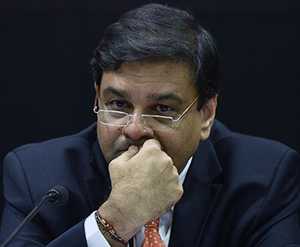New Delhi, Jan 18: RBI Governor Urjit Patel today faced some tough questions from MPs as he could not set a time frame for return of normalcy in the banking system even as the central bank asserted that Rs 9.2 lakh crore or 60 per cent of demonetised currency has been replaced.

Patel also could not give a definite number of old Rs 500 and Rs 1000 bills returned post demonetisation as RBI was still tabulating those. Sources said the Governor was spared a tough grilling at the meeting of the Parliament's Standing Committee on Finance as senior MPs including former Prime Minister Manmohan Singh intervened to say RBI as an institution needs to be respected.
Congress MPs like Digvijay Singh wanted Patel to be specific in his replies on lifting of cash withdrawal restrictions and wanted to follow through with tougher questions but were prevented by Singh and others, they said.
Patel, flanked by Deputy Governors R Gandhi and S S Mundra, explained to the members that discussions for demonetising high value currency notes between the government and the RBI had been going on since early 2016, and the central bank was in agreement with the government on the objective behind scrapping of the Rs 500/1000 notes.
The Committee headed by former Union Minister and senior Congress leader M Veerapa Moily had called the RBI and finance ministry officials to discuss the "demonetisation of Indian currency notes of Rs 500 and Rs 1,000 and the impact thereof".
As members could not complete their questions, the committee decided to call RBI Governor and ministry officials again on a later date, most likely after Parliament goes on a break during the Budget session.
"He (Patel) replied in part but he could not answer main questions. How much money has come back into the system and by when banks' operations will be normal. It seems RBI officials were in very defensive position on demonetisation," a senior opposition member said after the meeting.
The panel was informed that new currency worth Rs 9.2 lakh crore has been infused into the system post note ban. "Members asked several questions from the Finance Ministry officials as well as from the RBI Governor. As there was no time, the ministry officials would be replying to the questions on a later date.
"The RBI Governor replied to some questions. But the process could not be completed. They would be called again," sources said.
Some of the questions put to both the finance ministry and RBI related to who decided to go for demonetisation - Government or RBI; autonomy of the RBI; and why goal posts were being shifted from black money, counterfeit currency and terrorism to digital payments.
Members put questions to senior finance ministry officials including Economic Affairs Secretary Shaktikanta Das, Financial Services Secretary Anjuly Chib Duggal and Revenue Secretary Hasmukh Adhia. Das gave a presentation before the panel. Bankers including Chanda Kochhar (ICICI Bank) and Usha Ananthasubramanian (Punjab National Bank) also appeared before the panel.
The RBI Governor is also scheduled to appear before the Public Accounts Committee of Parliament on the same issue on January 20. In a surprise move on November 8, Prime Minister Narendra Modi had announced demonetisation of old Rs 500 and Rs 1,000 notes.
Following the decision, the RBI had put restrictions on withdrawal of cash from ATMs as well as from banks to deal with shortage of new high denomination currency notes. This led to long queues at ATMs and bank branches. All over the country, the banks had to deal with huge rush of people who thronged their branches to deposit junked notes. The deadline for depositing old notes with banks ended on December 30.
The cash situation has improved gradually with supply of new Rs 500 and Rs 2,000 notes. Yesterday, the RBI increased the daily withdrawal limit from ATMs to Rs 10,000 but kept the weekly ceiling at Rs 24,000.







Comments
Add new comment